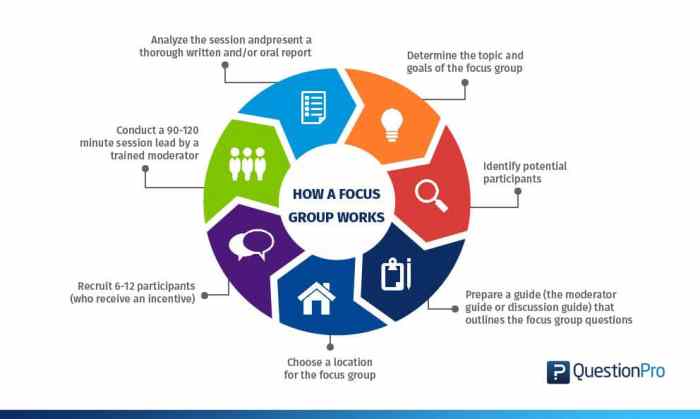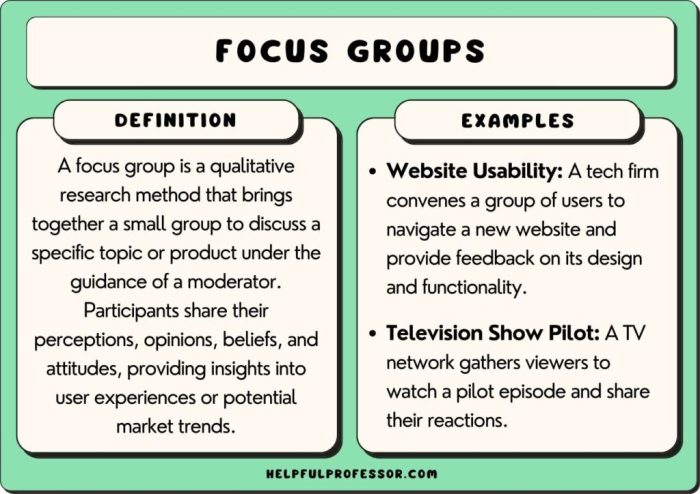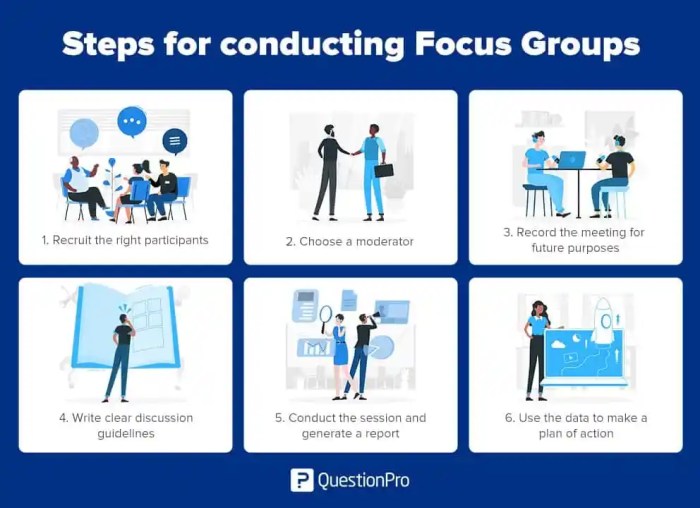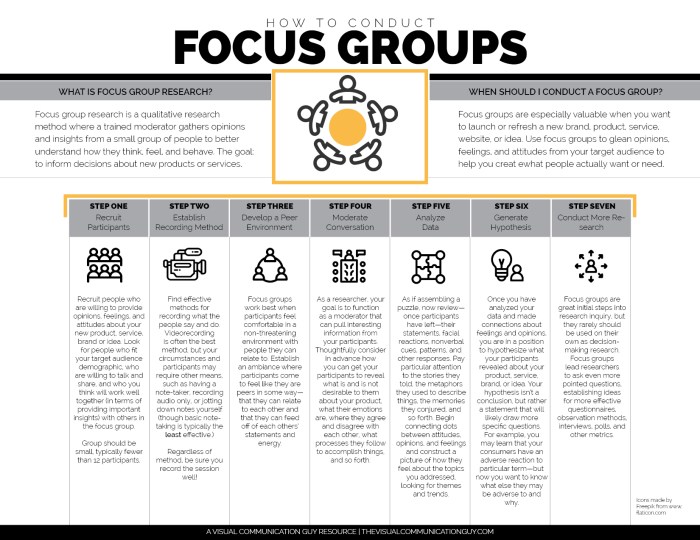Atkins research focus group text plays a pivotal role in understanding consumer behavior and market trends. This article delves into the intricacies of Atkins research focus groups, exploring their purpose, methods, and the valuable insights they provide.
Atkins research focus groups are carefully designed to gather qualitative data from a select group of participants, offering researchers a deeper understanding of specific topics. These groups provide a platform for participants to share their thoughts, opinions, and experiences, enabling researchers to gain valuable insights into consumer attitudes, preferences, and motivations.
Atkins Research Focus Group Text

Atkins Research focus groups are designed to gather insights and opinions from a targeted group of individuals on a specific topic or issue. These focus groups are conducted by experienced researchers who facilitate discussions and guide participants through a series of questions and activities.
The purpose of Atkins Research focus groups is to gain a deeper understanding of the target audience’s perspectives, attitudes, and behaviors. The insights gathered from these focus groups help inform decision-making and strategy development.
Topics Discussed in Atkins Research Focus Groups
Atkins Research focus groups cover a wide range of topics, including:
- Market research: Exploring consumer preferences, product testing, and brand perception.
- Product development: Gathering feedback on new product concepts, designs, and features.
- Advertising and marketing: Evaluating the effectiveness of advertising campaigns, messaging, and target audience reach.
- Customer satisfaction: Assessing customer experiences, identifying pain points, and improving service delivery.
- Public policy: Understanding public opinion on social issues, government initiatives, and policy changes.
Methods Used in Atkins Research Focus Groups
Atkins Research focus groups employ various methods to gather insights, including:
- Moderated discussions: Facilitated by a moderator who guides the discussion and ensures all participants have an opportunity to share their views.
- Questionnaires and surveys: Used to collect quantitative data and gather specific information from participants.
- Role-playing and simulations: Allowing participants to engage in real-world scenarios and provide insights into their decision-making processes.
- Observation: Recording participants’ non-verbal cues, interactions, and behaviors to gain a deeper understanding of their responses.
Participant Recruitment

Atkins Research places great importance on the recruitment of participants for its focus groups. To ensure the validity and reliability of the research findings, Atkins adheres to stringent criteria and employs diverse methods to recruit a representative sample of participants.
Criteria for Participant Selection
Participants for Atkins research focus groups are carefully selected based on specific criteria that align with the research objectives. These criteria may include demographic characteristics (e.g., age, gender, income level), psychographic characteristics (e.g., attitudes, beliefs, values), and behavioral characteristics (e.g.,
product usage, brand loyalty).
Methods of Participant Recruitment
Atkins utilizes a variety of methods to recruit participants for its focus groups. These methods include:
- Online recruitment: Atkins leverages online platforms such as social media and email marketing to reach potential participants who meet the specified criteria.
- Database recruitment: Atkins maintains a database of individuals who have expressed interest in participating in research studies. This database is utilized to identify and invite eligible participants for specific focus groups.
- Community outreach: Atkins collaborates with community organizations and local businesses to recruit participants from diverse backgrounds and perspectives.
Ensuring Diversity in Focus Group Participants, Atkins research focus group text
Atkins is committed to ensuring diversity in its focus group participants to capture a wide range of perspectives and experiences. Atkins actively seeks to recruit participants from different demographic, socioeconomic, and cultural backgrounds. This diversity enhances the validity and generalizability of the research findings.
Focus Group Structure

Atkins research focus groups adhere to a structured format to ensure effective data collection and engagement.
Each focus group typically follows a specific flow, designed to facilitate meaningful discussions and gather valuable insights.
Role of the Moderator
The moderator plays a crucial role in Atkins research focus groups, facilitating discussions, ensuring participant engagement, and maintaining a positive and productive atmosphere.
- Guides participants through the discussion topics.
- Encourages active participation and diverse perspectives.
- Maintains focus on the research objectives.
- Manages time effectively to cover all discussion points.
- Records key insights and observations for analysis.
Activities and Exercises
Atkins research focus groups often incorporate interactive activities and exercises to engage participants and stimulate discussion.
- Brainstorming sessions:Generating ideas and perspectives on a specific topic.
- Role-playing exercises:Enacting real-life scenarios to explore different viewpoints.
- Card sorting activities:Categorizing or prioritizing items based on preferences or perceptions.
- Concept mapping:Creating visual representations of relationships between ideas or concepts.
- Storytelling exercises:Sharing personal experiences or anecdotes related to the research topic.
Data Analysis

Atkins Research employs a rigorous and systematic approach to data analysis to extract meaningful insights from focus group discussions. Our methods ensure the reliability, validity, and actionable nature of our findings.
To ensure reliability, we use multiple coders to independently analyze the data and compare their interpretations. This process helps to minimize bias and ensure consistency in the coding process.
Validity
Validity is ensured through triangulation of data sources. We combine focus group data with other research methods, such as surveys, interviews, and observations, to corroborate and validate our findings.
Insights
Atkins focus group data has yielded valuable insights that have informed our clients’ decision-making and product development strategies. For example, our research identified key unmet customer needs, leading to the development of new product features that have significantly improved customer satisfaction.
Reporting and Dissemination

Atkins Research utilizes various formats to report the findings of their focus groups, including written reports, presentations, and online dashboards. These reports are tailored to the specific needs of their clients and may include executive summaries, key findings, insights, and recommendations.
Channels for Dissemination
Atkins Research disseminates the findings of their focus groups through multiple channels to ensure wide reach and impact. These channels include:
- Client presentations:Findings are presented directly to clients in tailored presentations that highlight key insights and implications.
- Written reports:Comprehensive reports are provided to clients, detailing the research methodology, findings, and recommendations.
- Online dashboards:Interactive dashboards are created for clients, providing real-time access to focus group data and insights.
- Publications:Atkins Research publishes findings in industry journals and conference proceedings to share knowledge and contribute to the broader research community.
Impact on Decision-Making
Atkins Research focus group findings have significantly influenced decision-making processes within various organizations. For example:
- Product development:Findings have guided product design, marketing strategies, and customer service initiatives.
- Policy development:Insights have informed public policy decisions, shaping regulations and programs.
- Brand positioning:Research has helped organizations understand consumer perceptions and develop effective brand strategies.
Query Resolution
What is the purpose of Atkins research focus groups?
Atkins research focus groups aim to gather qualitative data from a select group of participants, providing researchers with insights into consumer behavior, preferences, and motivations.
How does Atkins ensure diversity in their focus group participants?
Atkins employs various methods to ensure diversity in their focus group participants, including targeted recruitment strategies, community outreach, and partnerships with organizations representing diverse populations.
What methods does Atkins use to analyze data from research focus groups?
Atkins utilizes a combination of qualitative and quantitative analysis techniques to extract insights from focus group data, including thematic analysis, content analysis, and statistical analysis.